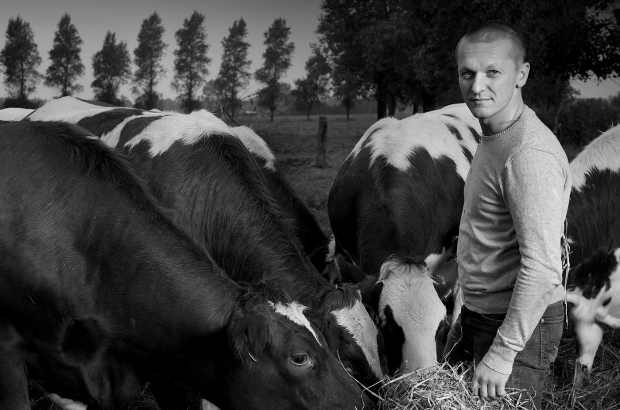- Daily & Weekly newsletters
- Buy & download The Bulletin
- Comment on our articles
Hendrik Dierendonck: 'I wanted to be a butcher since I was four years old'
Over the past few years, the name Dierendonck has become synonymous with quality Belgian butchering. Restaurants such as Vincent, Mauru, La Paix, In de Wulf, The Jane and Pistolet Original proudly let their customers know that they use mostly or only Dierendonck products.
At the new Brussels store on the Rue Sainte-Catherine, the former premises of Jack O'Sheas, more often than not there is a queue spilling out into the street. The Bulletin caught up with Hendrik Dierendonck to find out how he does it.
Why are you a butcher? Was it a family affair?
Yes, I’ve been saying that I want to be a butcher since I was four years old. My parents had a butcher shop on the coast in Sint Idesbald/Koksijde. We lived above it and I grew up with the passion from my parents for the craftsmanship.
What makes Belgian red beef different?
The special quality of the Belgian red beef is it is raised on the grass of the fields of Flanders. When they’re a little bit older, they’re used for the milk as well as for the meat, which gives a very creamy meat. It’s not so fat on the inside, it’s got a nice colour - for me it’s the best meat, it gives me memories from the past.
So you have your own herd of Belgian Red in the Westhoek?
Yes we call it the West Flemish Red Cow and it’s a cow that was almost extinct. Together with some farmers we tried to raise it again so now we have about 3,000. The terroir is very important, both for the animal and the food. We use only the best products, we give them good food. A happy cow, a happy life, good food - that’s the philosophy behind how we try to work.
What’s the secret to the high quality of your products?
I always keep in mind the craftsmanship of the past. There’s some values and a traditional way of working that you have to keep. Meat needs time to mature and I think that's the secret of keeping our high quality. Of course, you have to innovate, you have to work on new machines, new technologies, but nevertheless you always have to keep that traditional way of working and asking yourself, is this still the same product as before? And I think that’s what we’re trying to protect.
You have a lot of other meats in your store - pigeons, chickens, hare. Are they all from small farms and producers?
Yes, for us that’s the biggest challenge. I only can open a new shop when I have the right farmer and the right animal to sell in that shop. That's the challenge for the future and we have a lot of clients who understand it very well. When we don't have the animal someone is looking for, we suggest something else.
As well as your red beef, you carry meat from Spain, Germany, Italy, the UK, France. How do you source it?
At one time we got some selections from Rungis wholesale market in Paris, but now I have a network all over Europe from small cooperatives and farmers. I think that is also the specialty of Dierendonck - we make a selection all over Europe, they have to follow the same philosophy that we do, and that has become a speciality of our butcher shop.
Your cold cuts are all made in house?
At the shop in Sint Idesbald on the Belgian coast I imported things like pata negra and Parma ham, but here in Brussels I really wanted to start a Belgian-Flemish butcher shop, so all that we have we prepare ourselves. We don’t import anything, and we’re proud of our products and what we do, we want to keep that Belgian charcuterie alive.
With more and more restaurants using your products do you worry about maintaining quality? Do you turn potential clients down?
When you grow you sometimes have to take a step back and start up again, like a kid learning something. I enjoy a lot that people come to me and appreciate how we work, what kind of meat we have, and I’ll do the best I can to preserve that quality and that philosophy. Turn down clients? Yes, we sure do, every day I have new restaurants calling me, asking can we buy your meat. There has to be a connection - they have to follow that same philosophy.
Pistolet Original asked me to come up with a special summer pistolet - something a bit refreshing. I thought we would use the neck of the beef - it’s juicy, it’s got a little fat inside - and we mature it for two weeks, then put it in salt for a month and dry it again. So it really has that nutty flavour, it’s a West Flemish coppa and it goes very well with old Brugge cheese, vinegar, salad, a little bit of parmagiano chese, all in a crusty pistolet.



















